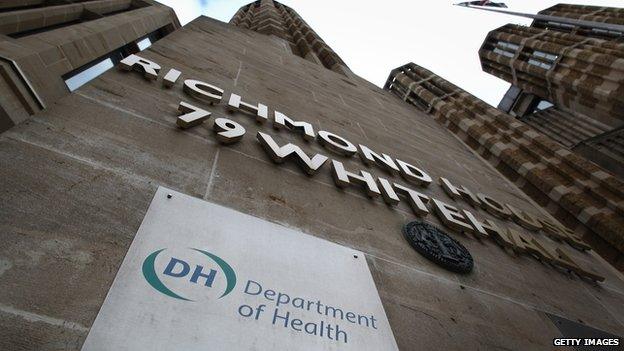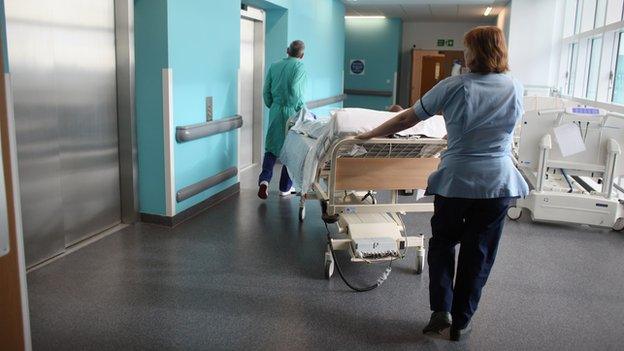NHS finances: A likely headache for the next government
- Published

As the post-Budget debate on the extent of future austerity rages on, there has been a sobering reminder of the financial needs of the NHS next year and beyond.
Whichever of the main parties is in power will be looking for more spending cuts across Whitehall. There will be a continued drive to squeeze budgets. But that task could become even more challenging because of the demands of the health service in England.
The latest figures from NHS trusts, published by their regulator the Trust Development Authority, external, reveal a widening deficit - £467m over the nine months ending in December.
Add to that the recent numbers from Foundation Trusts from their regulator Monitor and you have a total deficit for that period amongst all NHS providers in England of nearly £800m.
For the full financial year a deficit of up to £1bn for these trusts, covering mental health, ambulance and community health trusts as well as major hospitals, now seems likely.
How much does this matter?
Deficits amongst providers don't tell the whole story of the finances of the NHS. There are surpluses tucked away in other budgets. The Department of Health can always pump prime to make the books balance at the end of the year.
It is clear that there have been discreet transfers of cash from the department to the NHS in recent months. So the numbers for the current financial year, which only has a couple of weeks to run, can be made to add up.
It is next year, 2015-16, which is now causing headaches.
Tough decisions
The Trust Development Authority itself says "the worsening position remains a major concern".
The King's Fund think tank argues that "its clear the next government will inherit a health service under huge financial pressure, with deficits among hospitals and other providers likely to continue rising".
Demand for health care continues to outstrip the planned supply of funding to the NHS. The service is already at full stretch.
But, you may ask, how can the NHS be struggling when the chancellor, barely three months ago, announced an extra £2bn for the service for the 2015/16 year?
The reality, according to senior health sources, is that the extra funding was barely enough to enable the NHS to continue providing a normal level of care.

Chris Hopson, chief executive of NHS Providers which represents health trusts, believes the overall deficit for the forthcoming year could be as much as £2.5bn, and that's even after taking account of the chancellor's cash injection.
So whoever is in control from May at Richmond House, headquarters of the Department of Health, will have some tough decisions to make.
Surpluses in other parts of the NHS won't make much of a dent in a deficit of £2.5bn (if it is that high).
That will leave trusts to fall back on cash reserves to plug gaps in their budgets. But if those cash reserves run dangerously low the only remaining option will be another handout from Richmond House.
There will of course be demands for trusts to become even more efficient and to make better use of resources.
Old hands in Whitehall have always been ready to call the bluff of hospital chiefs complaining about their budgets. But with such a large potential financial gap, the incentive for trusts to try to cut individual deficits will be dulled.
They may decide its not worth the bother if a bailout is inevitable.
As the new government grapples with the public finances and decides where the next cuts will come, there will be an unpalatable item high in the in-tray.
There will probably have to be a choice soon between another cheque for the NHS or more missed targets and deteriorating services for patients.
- Published11 March 2015
- Published25 February 2015

- Published21 February 2015

- Published29 January 2015
